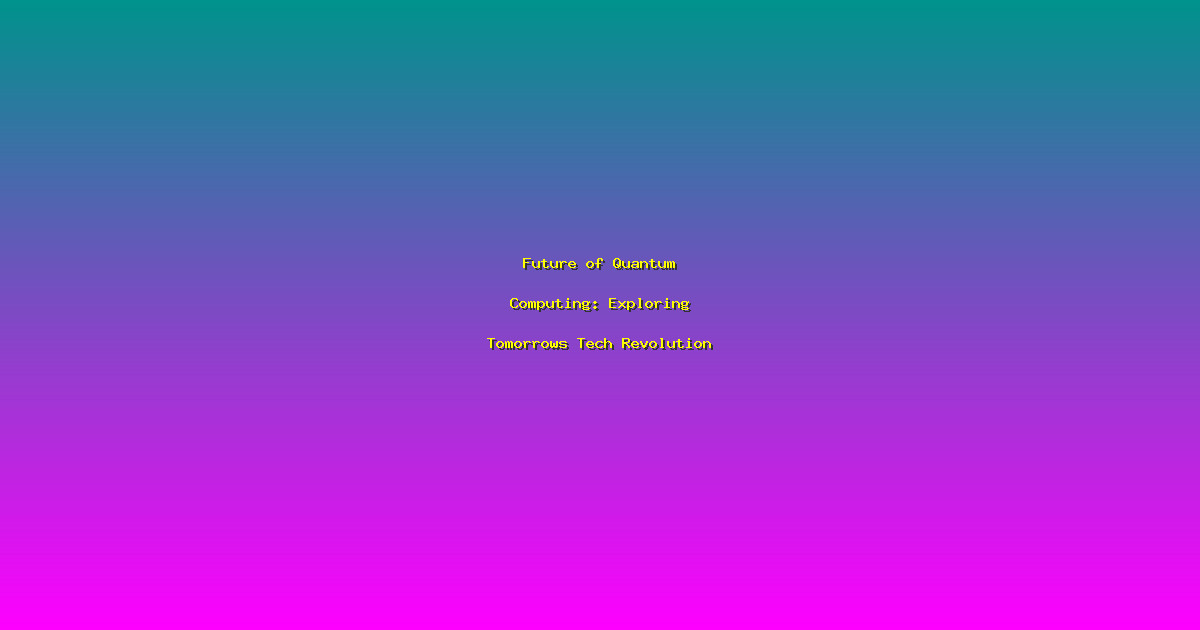Future of Quantum Computing: Exploring Tomorrow's Tech Revolution
The future of computing is on the horizon, and it's quantum. Quantum computing represents a leap forward in processing power that could redefine how we approach complex problems in fields ranging from cryptography to drug discovery. This technology leverages the principles of quantum mechanics to perform calculations at speeds and in ways that classical computers simply cannot match. As we stand on the brink of this technological revolution, it's crucial to understand what quantum computing is, where it's headed, and how it might change our world.
What is Quantum Computing?
Quantum computing is a form of computing where data is processed according to the laws of quantum mechanics. Unlike traditional computers, which process information in binary bits (0s and 1s), quantum computers use quantum bits, or qubits. These qubits can exist in multiple states simultaneously, a phenomenon known as superposition, which allows for exponentially more complex computations compared to classical computers. This capability of handling vast amounts of data and performing complex calculations swiftly makes quantum computers ideal for solving problems that are currently intractable for classical systems.
The Potential of Quantum Computing
Quantum computing has the potential to transform numerous sectors. In cryptography, quantum computers could break current encryption methods, necessitating new quantum-resistant algorithms. In pharmaceuticals, they could accelerate drug discovery by simulating molecular interactions more accurately and quickly. In finance, they could optimize investment strategies and risk management with unprecedented precision. The possibilities are vast, and as technology advances, we can expect to see quantum computing applied to a widening array of industries and problems.
Challenges and Current Limitations
Despite its promise, quantum computing still faces significant challenges. One of the biggest hurdles is maintaining the delicate state of qubits, known as coherence. Environmental factors can easily disrupt this state, leading to errors in computations. Additionally, building and maintaining the specialized hardware required for quantum computing is a complex and costly endeavor. However, ongoing research and development efforts are steadily overcoming these obstacles, paving the way for more accessible and efficient quantum computing systems.
Exploring the Future
As we look to the future, the trajectory of quantum computing is clear: more powerful quantum computers will likely emerge, capable of tackling even more complex problems. Innovations in hardware and software will refine the technology, making it more reliable and accessible. It's also anticipated that the integration of quantum computing with artificial intelligence and other advanced technologies will lead to revolutionary breakthroughs, bringing us closer to a future where complex problems are solved with ease and efficiency.
FAQs
1. What makes quantum computers more powerful than classical computers?
Quantum computers leverage the principles of quantum mechanics, allowing qubits to exist in multiple states simultaneously. This superposition capability enables quantum computers to perform complex calculations much faster than classical computers.
2. When will quantum computers be widely available?
While quantum computers are already being used in research and development, their widespread availability is still some years away. Current limitations in hardware and software need to be addressed before they can be utilized in a broader range of applications.
3. How does quantum computing affect cybersecurity?
Quantum computing poses both a threat and an opportunity for cybersecurity. It could potentially break current encryption methods, but it also opens up possibilities for developing new, quantum-resistant encryption techniques.
4. What industries will be most affected by quantum computing?
Industries such as finance, pharmaceuticals, and cryptography are expected to benefit significantly from quantum computing. These sectors deal with complex data and problems that quantum computers are uniquely suited to address.
5. How much will quantum computing cost?
The cost of quantum computing varies greatly depending on the scale and complexity of the system. Initial costs are high due to the specialized hardware and technical expertise required, but these costs are expected to decrease as the technology matures and becomes more widely adopted.
Conclusion and Call to Action
Quantum computing stands at the forefront of technological innovation, offering solutions to some of the most challenging problems facing humanity today. As we push the boundaries of what's possible with this technology, the potential benefits are immense. Whether you're a tech enthusiast, a business leader, or a student of the sciences, staying informed about quantum computing is crucial. Join the conversation, explore the possibilities, and be part of the shift towards a new era of computing.

